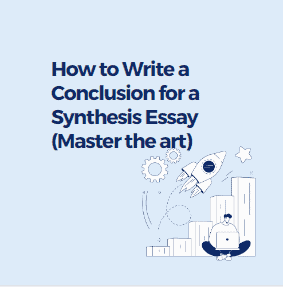How to Write a Conclusion for a Synthesis Essay (Master the art)

A powerful conclusion in a synthesis essay is essential as it adds the final brushstrokes to a masterpiece. It can be compared to artists leaving a lasting impression depending on how they select and arrange their colors. Solid and compelling conclusions aid in creating an image of the writer’s idea in the reader’s mind. Learn how to write a conclusion for a synthesis essay with us!
How to write a conclusion for a synthesis essay: 9 Benefits
A conclusion for a thesis is a final thread aiming to bring together all the ideas and arguments the writer anticipated. Here are some of the advantages of a firm conclusion.
We define a conclusion as a paragraph intending to reiterate the main points and the key arguments the writer has synthesized from various sources. Its main objective is to briefly overview a writer’s whole journey in combining all the viewpoints in their thesis.

- In the conclusion, we get the summary of the synthesis process.
- It brings an emphasis to the thesis.
- It is in conclusion that we get closure.
- Leaves a long-term imprint
- Emphasizes significance
- A compelling conclusion calls for further thoughts.
- Some conclusions Propels action
- Healthy conclusions exhibit mastery.
- Firm conclusions highly contribute to the quality of the general essay by binding up loose ends, supporting the argument’s strength, and answering questions.
What does a powerful conclusion entail?
For a conclusion to be considered vital, a writer must consider a few things that make it effective. Here are some of the considerations to consider when writing a conclusion for a synthesis essay.
Summarize the main points.
A conclusion summarizes the main points highlighted in the essay. However, a writer should avoid restating what they have already said in their thesis and focus on briefly synthesizing the ideas.
Leave a lasting impact.
A reader will think about your topic long after reading a solid and robust conclusion.
Connect your conclusion with the introduction.
Connecting the two should highlight the reader’s journey since beginning to read your essay. It should, therefore, emphasize the significance of the message passed. A successful connection between the introduction and the conclusion should add some depth, and there definitely should be an impact.
Examples of Conclusions: The different Variants
Conclusions come in various forms; it depends on the writer’s purpose and the nature of their essay. Here are some of the different types of conclusions
- Summary conclusion – just as the name suggests, this summarizes the main points and provides an overview of the essay.
- Thesis restatement conclusion – involves restating the thesis differently from how the writer did in the introduction. Restatements are majorly known for reinforcing the argument.
- Implications conclusion – in such conclusions, it is in this section that writers broaden the consequences of the main idea. They defend their remarks and explain how these remarks will lead to taking action.
- An open-ended conclusion is usually exciting since a writer can pose a thought-provoking question or a statement that will leave the readers thinking further about the topic.
- Call to action conclusion – readers are requested to take specific actions or engage in particular activities directly or indirectly related to the theme of the essay.
- Resolution conclusion – this is for those essays that focus on a problem or a conflict. The decision would be the best section to suggest potential solutions or resolutions. They also bring forth a sense of closure.
- Contrast/ comparison conclusion – if the essay focuses on contrasting different ideas or approaches, the writer could give similarities, synthesis, or differences in the conclusion
- Personal anecdotal conclusion – here, a writer shares their personal experiences, which should relate to the story’s theme.
- Circular closure conclusion – the circular motion comes from the fact that a writer revisits an idea they had posed in their introduction and connects it with their conclusion.
- Quotation conclusion – a reader expects a relevant, thought-provoking quote in this kind of conclusion. It can be from your source or a well-known figure.
- Provocative statement conclusion – a bold and memorable statement that can spark the reader’s curiosity or even leave a strong impression is all found here.
- Forecasting conclusions: They give the reader an imagination of the future possibilities related to the discussion topic.
How you can come up with a solid conclusion
We now know the elements of firm conclusions for your synthesis and the different types of conclusions. Here is how we can come up with such conclusions:
- Using strong, confident, and authoritative language
- Keeping the conclusion brief and to the point
- Avoid introducing new information or arguments in the conclusion
- Consider broader implications that go beyond the simple summary of the main points
Mistakes to evade how to write a conclusion for a synthesis essay
To ensure that your conclusion is firm, these are some things to keep in mind when writing your conclusion.
- Avoid repetition of the thesis
- Do not introduce any new information
- Use confident language. Some refer to it as authoritative
- Ensure the conclusion ties back to the introduction
How to Write a conclusion for a Synthesis: Revising and editing!
Here are more tips to ensure a conclusion is as strong as possible
- Always read your close aloud to identify any awkward phrasing or unclear sentences
- Check that the conclusion follows a logical progression
- Please share with friends and colleagues to get their insights and suggestions
- Take your time to proofread to remove fluff in the conclusion, grammar or spelling mistakes
F.A.Q
What is the main purpose of a conclusion in a synthesis essay?
A conclusion ties together all the points highlighted in a synthesis essay and reinforces them by summarizing the main points.
What makes a conclusion outstanding?
Powerful quotes, thought-provoking questions, or even reconnecting a conclusion with the introduction are some things that impact a conclusion.
Can I have new information in the conclusion?
No. A conclusion should only synthesize and summarize the existing information, not introduce new information.
Conclusion
Through this article, it is evident enough that crafting a solid conclusion is an essential skill every writer should possess. Once they understand the importance of having a close, what elements make a conclusion effective, and the various types of conclusions, they can come up with an engaging conclusion. Master the art of writing a powerful conclusion by carefully studying this article and aim at having it at your fingertips.






